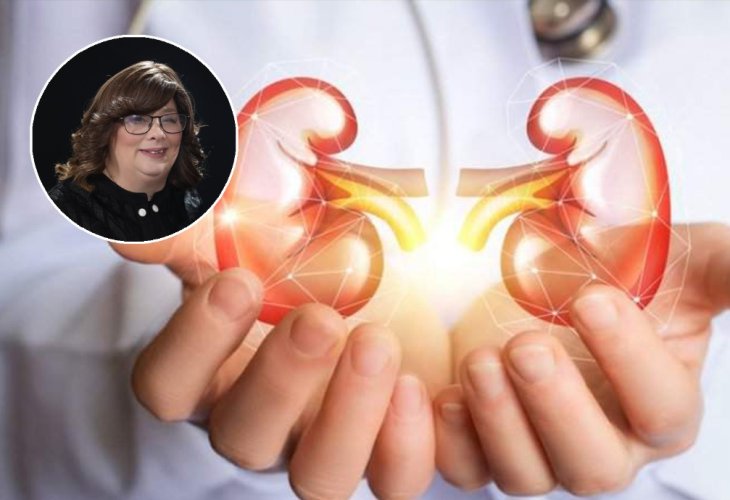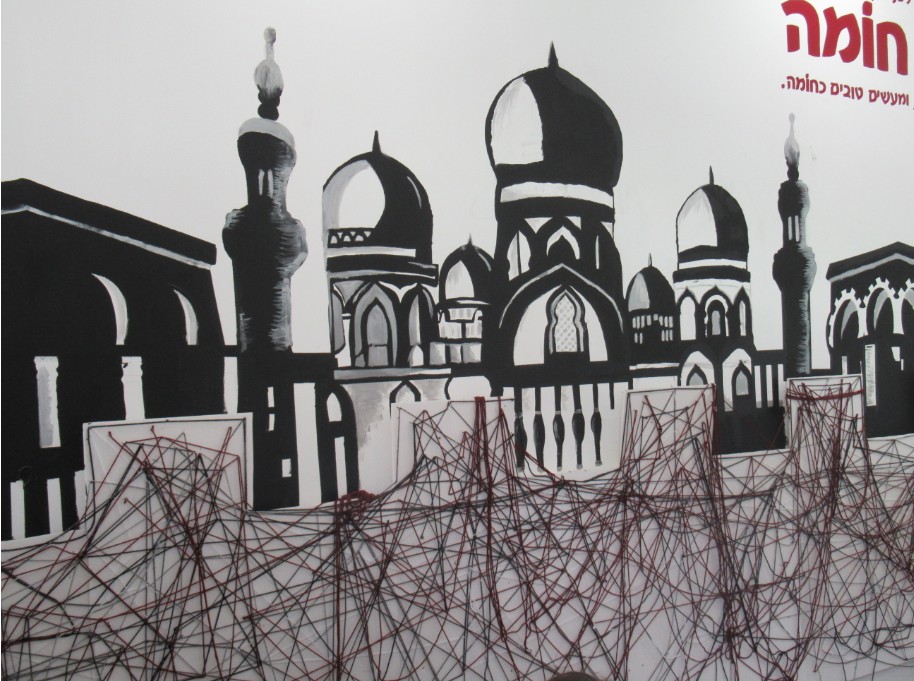"We Saved Our Daughter's Life, But We Had to Care for Her Emotional Well-Being"
Ten years after her daughter's life was saved through a dramatic kidney transplant that made headlines across the U.S., Judith Bogatch realized she had to find the right educational framework for her daughter, leading to the founding of the Haredi High School for Arts, which sparked a revolution.
 (Photo: shutterstock) Inset: Judith Bogatch
(Photo: shutterstock) Inset: Judith BogatchFive years ago, Judith Bogatch's daughter finished her studies in eighth grade, and Judith can't forget that time. "My daughter Chani is a wonderful and talented girl, but she has a complex medical history," she recounts. "Chani needed a kidney transplant from the day she was born. Her first transplant happened when she was a little over one year old, but half of the kidney was rejected after two weeks due to the challenges of such transplants at a young age. Due to her severe condition, she underwent dialysis treatments that at some point were almost ineffective, her hair fell out, and it was clear she was in great life danger. Throughout this period, we lived abroad with her, hoping to find a kidney that would save her life."
Judith notes that at that time, there was almost no awareness of kidney donations in the country and worldwide, as Rabbi Yeshayahu Haber’s 'Gift of Life' organization did not exist. "We searched for a kidney across the U.S. for Chani," she says, "and the only place willing to try to find a kidney for her was in Minnesota, so of course we flew there and lived near the hospital for years with Chani and our other children. It was a challenging and stressful period that ended when an American woman, who isn’t Jewish, volunteered to donate a kidney to Chani. This story made headlines and became widely discussed throughout the U.S."
Surprisingly, the kidney was a perfect match, even though the doctors said there was only a one in a million chance of a perfect match. "Heaven orchestrated things such that Chani received the kidney and the surgery was a complete success," Judith excitedly explains.
"We returned to the country with a healthy child," she adds, "Although due to dialysis complications she has some hearing difficulties, we managed to integrate her into regular kindergartens and later in Beit Yaakov School in the Matresdorf neighborhood. She had better and worse years, mainly facing medical and educational challenges, but throughout I saw she was immensely talented in arts and had a developed technical sense. She navigated computer intricacies well, created stunning works, and when engaged in these fields, her success knew no bounds."

Bringing Abroad to the Country
"As Chani neared the end of eighth grade, we found ourselves at a crossroads," says her mother. "I knew she had received her life, thank Hashem, but it was important to me that she also gains emotionally fulfilling life and achieves her potential. I consulted a professional and asked her: 'What would you do if it were your daughter?' She replied: 'I’d send her to an arts high school abroad.' This seemed too much for me. We had already spent five years of our lives abroad and didn’t consider returning, but from her sentence two words shone – 'arts high school.' I thought to myself, if we’re not flying abroad, we can bring abroad here."
Judith recognized the need for such a high school also from her role as a teacher. "I’ve worked in education for years," she explains, "and always encountered very talented girls whose many skills go unexpressed in existing frameworks. For instance, when I taught English, I tried to integrate arts, drama, and music into the learning. It was amazing to see the girls’ eyes shine as they absorbed the language. They began mastering English to the point where at yearly parent evenings, parents would inquire if the girls performing on stage were native English speakers. They truly absorbed English through their talents. It was during those days that I began nurturing the dream of establishing an arts high school."
"When Chani finished eighth grade, I approached the principal of Matresdorf School – Mrs. Tzipora Heisler – and asked why they don’t open an arts seminary for the Haredi public. She replied: 'Because you need someone crazy for it.' I answered: 'I'm willing to be the crazy one.' Mrs. Heisler smiled and promised: 'Then I will help.' At that moment, I started to explore and search if anyone had tried to set up something similar across the country, and thus I met a professional woman who had established a very similar framework for the secular public in the Rishon Lezion area. I came to her with Mrs. Heisler and several staff women, and she welcomed us amazingly, revealed many professional secrets, and promised assistance in whatever we needed. At this point, it was already clear we were moving forward."
Judith opened ninth grade with only four students, including her daughter, but by the end of the year, twelve girls were in the class, and more wanted to join but couldn’t due to lack of space. The following year, there was no need for advertising anymore, as the class filled up on its own. Today marks the fifth year of the 'Fruit of Wisdom' Seminary, including full classes from ninth to twelfth grade.
Where do the funds for managing such a seminary come from?
"It’s indeed a challenging task," she admits, "I mainly rely on donations from abroad, but it’s a daily challenge."

Witnessing Success
If you enter the seminary in the morning, you might not notice its uniqueness, as it operates like any Beit Yaakov seminary. The students are required to arrive in uniform and comply with the rules. Morning classes include sacred studies by the educators, and there are also classes in English, mathematics, science, history, and more. Only after these lessons come the art studies, which include graphics, interior design, video editing, photography, ceramics, jewelry making, oil painting, high-level pastries, sewing, event design, and many more top-level classes. Recently, a professional 'Galit Italia' course was also added.
"The students experience success, and suddenly they come asking for an extra hour of mathematics per week because they also want to invest in academic studies," Judith explains. "We laugh about it together because at the start of ninth grade they are so terrified of mathematics, they practically have trauma from it, but after they experience success and express themselves through art, mathematics doesn’t seem so scary anymore. These days we’re working on arranging, in addition to creating portfolios and certificates from the Ministry of Education after four years of study, arts as well as English and mathematics exams. I hope it succeeds, but for me, the girls’ success isn’t measured in that, but by the fact that they leave happy and confident in themselves. I don’t need to talk to them and tell them: 'You are good and successful,' instead they see it themselves. That’s success."
Incidentally, Judith mentions that at the high school's beginning, she approached Rabbi Yisrael Ganz, the rabbi of the Matresdorf neighborhood, with the idea. "He was very impressed and told me a sentence that struck my heart: 'So many of the domestic peace issues that come to me stem from the bitterness of high school years.' He explained that to build a good home, a girl must leave schooling with joy of life, fully utilizing her skills, and self-confidence. When she recognizes her personal worth and fulfills her talents, it’s easy to pass it on to her family without needing approval for every step."
"I think," emphasizes Judith, "it’s crucial to introduce awareness and appreciation for the arts in our community, understanding it’s a great tool for making a good living, just like other professions. Part of the process, according to Judith, also involves teaching parents to appreciate their daughters' amazing talents, just as there is appreciation and awareness for the arts in the U.S. and the general public."

Strength and Sensitivity
Throughout the years, the seminary encourages the girls to integrate into the workforce starting from the eleventh grade. Thus, some girls manage art classes and others are invited to different events to deliver workshops. "About a month ago," recalls Judith, "one of the teachers teaching event production took two girls to manage a flower arrangement event in front of sixty teachers from the independent education sector. The chosen students returned stunned, suddenly they were the ones who needed to explain to the teachers how to arrange the flowers and assist those struggling. One of them later shared with me: 'I returned home and couldn’t stop laughing all day. I couldn’t get over the thought that I was the one teaching the teachers, some of whom I knew from elementary school. Suddenly, I, who didn’t know math, was teaching the great math teachers.'
"We conduct exhibitions three times a year and try to release CDs every few months," adds Judith, "Our senior team comprises over fifteen teachers, each very professional in her field."
She pauses for a moment, clearly finding it hard to continue. It turns out that one of the senior teachers in the team was teacher Racheli Gutman, may she rest in peace, who was killed in a tragic bus accident that occurred last Adar while leaving from Modi’in Illit. "Teacher Racheli taught art and religious laws with us and the students loved her very much. She was on her way to us when the accident cut her journey short," Judith whispers, "The girls waited and waited for her until receiving the bitter news. They created an amazing exhibition containing things they learned from her and even wrote a song about her that left us all in tears. Our girls have so much sensitivity, and they are so powerful in their personalities, studies, and in everything."

